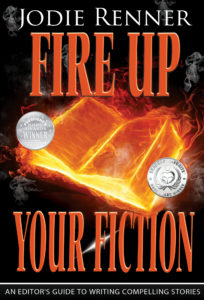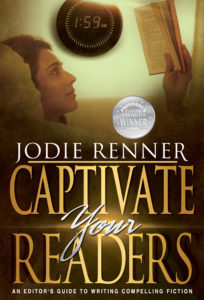Okay, maybe not ALL, but your choice of verbs can make or break a scene. Have a look at a recent chapter or short story you’ve written. Check the verbs in particular. Maybe even highlight them. Are some or a lot of them bland, vanilla verbs like came, went, arrived, approached, walked, ran, or looked?
Do you have a heavy, tired, or angry character simply walking when he could be trudging or clomping or stomping or plodding? Or an old or ill or exhausted character walking who should be limping or shuffling along? Make the conceited or over-confident guy swagger or strut and the lawyer stride into the courtroom. And be sure your drunk, stoned, or injured suspect is staggering, lurching, wobbling, meandering, or shambling, not just walking. Or perhaps someone is running when sprinting or racing or darting or dashing or fleeing would better capture the situation and her mood.
Of course, sometimes an ordinary character on a regular day is just walking or jogging. But when you need to bring the character and scene to life and add tension (which is most of the time), use all the tools in your toolbox to create sensory impressions for the readers and engage their emotions — make them worry.
If you’ve got a character looking at something or someone, consider whether they really are just looking. Or are they actually peering at something? Or observing or studying or examining or inspecting or scrutinizing it? Or perhaps they’re covertly spying at a group around a campfire. Or maybe they’re glancing around them or catching a glimpse of someone. Or glaring at another person in anger. Or squinting into the distance under the glaring sun.
Be sure your words, especially the verbs, capture the mood you’re after.
And don’t prop up a weak, overused verb with an adverb. Instead of “She walked quietly,” say she crept or she tiptoed or she sneaked or she slinked along the wall.
 For a whole chapter on finding just the right verb for every scenario, check out my award-winning writing guide, Fire up Your Fiction, chapter 21, “Choose Words That Nail It.” Subtopics include People in Motion, Words for “Walked,” Replacements for “Run,” and Different Ways of Looking. (Lots of other great stuff for writers in there, too!)
For a whole chapter on finding just the right verb for every scenario, check out my award-winning writing guide, Fire up Your Fiction, chapter 21, “Choose Words That Nail It.” Subtopics include People in Motion, Words for “Walked,” Replacements for “Run,” and Different Ways of Looking. (Lots of other great stuff for writers in there, too!)
Let’s add a bit of urgency to the sentence below by changing up the verbs:
The NCIS agents drove to the scene, then went to the back of the vehicle and pulled out their equipment.
Here’s one possibility:
The NCIS agents raced to the scene, then hurried to the back of the vehicle and grabbed their equipment.
Note how changing just three verbs can amp up the scene. You could probably charge it up even more.
Are you accidentally sabotaging your scene by choosing a verb that gives entirely the wrong impression?
Make sure none of your verbs are actually working against the scene, undermining the effect you’re after. Do you inadvertently have characters strolling or ambling or slouching at tense times? Or leaning back during an argument? Be sure not to use shuffling for the walking of someone who isn’t old, sick, weak, or very tired.
Remember that tension and conflict are what drive fiction forward, so unless you’ve got two lovers taking a romantic walk, don’t have your characters strolling along when they should be hurrying or hustling or darting in and out, glancing around and behind them. Relaxed, easygoing verbs aren’t going to get your reader’s pulse quickening and make her want to turn the page to read more.
Also, think about the difference between a smile and a smirk and a sneer. Don’t have a character sneering when they’re just smirking. Sneer means “to smile or laugh with facial contortions that express scorn or contempt.” So if you have buddies disagreeing or teasing each other, you might use smirked, but don’t use sneered. Save that for someone nasty.
There are a lot of nuances for showing a character looking at someone or something. The verbs glare, glance, scan, peer, study, and gaze have quite different meanings, for example.
Do you have characters glaring when you mean gazing or staring or studying or scrutinizing? For example,
Brock glared at the intruder with the gun, eyes wide with fear. He shifted his stare to Gord, mouthing, “Help.”
“Glared” doesn’t go with “eyes wide with fear.” Glared is for anger. Maybe “stared” here? And “shifted his gaze”? Or maybe:
Brock’s eyes widened with fear at the intruder with the gun. He shifted his gaze to Gord, mouthing, “Help.”
How about eyes squinting when there’s no bright light?
At the funeral, the widow caught Adam’s glance and squinted her eyes in accusation. She no doubt held him responsible for her husband’s death.
I’d say “narrowed her eyes” or “glared at him.”
Watch for “happy” verbs that have sneaked into your story at tense times.
Have any happy, carefree words or dreamy imagery somehow slipped into any of your scenes at tense moments? If your two young protagonists are running for their lives in the woods, don’t mention the birds chirping or the brook babbling or the leaves dancing in the breeze. Keep all your imagery scary and ominous – darkness, nasty weather, treacherous terrain, a howling wolf, or whatever.
Find the “happy” or “comfy” verbs that are subtly dissipating the tension in the scene below in a crime novel:
They pursued the getaway car on a dark, lonely country road. Lights from farmhouses twinkled in the distance. Up ahead, they saw the car spin out and crash into a tree. They pulled up behind it and got out. Tony shone his flashlight into the car. The windshield was fractured. Bits of glass sparkled throughout the inside, and steam rose from the damaged engine.
Yes, “twinkled” and “sparkled” normally have positive connotations, so they counteract the tension you’re trying to build in a scene like this.
Similarly, don’t use casual, relaxed language in a stressful situation:
Johnson and Fernandez parked their cruiser at a distance, then jogged at a comfortable pace to the scene of the crime.
Best to not use words like “comfortable” or even “jogging” at a time of stress. Choose words that fit the anxious mood and tone of the moment better.
Or if someone is about to face a harsh boss, be reamed out about his behavior, and likely fired, avoid detracting from the tension like this:
“You can go in now,” the secretary said, holding the door open for him. He found himself in a comfortable outer room with a stunning view, several armchairs, a bookcase, and a sofa against a wall. A large oak door stood closed on the far wall.
At such a tense time, it’s best not to add anything comfortable or any obviously positive words like “stunning.” That dissipates the tension at a time when you need to keep building it. Besides, the guy isn’t thinking about the view or the comfy furniture at this moment!
Here’s an example from a different book, describing the actions of a nasty villain about to shoot someone:
Before: He smiled. (doesn’t sound very nasty)
After, revised by the author: His mouth was twisted in a cruel smile.
So what’s the takeaway from all this? Don’t overdo the bland, boring verbs, or your scenes will be bland and boring. But if you’re looking for a unique synonym and you’re not 100% sure of the nuances, look each one up in the dictionary so you don’t have your character sneering when you mean smirking, or squinting when you mean peering or glaring.
Your turn. Share some possibilities in the comments below if you feel like playing.
How would a bunch of SWAT team members move after a few miles when training on rough terrain in bad weather?
How would two carefree little girls move around the playground?
How about two top contestants on Dancing with the Stars? How are they moving across the ballroom floor?
How about a more vivid way to say “took” or “carried” something?
* * *
Jodie Renner is a freelance fiction editor and the award-winning author of three craft-of-writing guides in her series An Editor’s Guide to Writing Compelling Fiction: Captivate Your Readers, Fire up Your Fiction, and Writing a Killer Thriller, as well as two clickable time-saving e-resources, Quick Clicks: Spelling List and Quick Clicks: Word Usage. She has also organized two anthologies for charity, incl. Childhood Regained – Stories of Hope for Asian Child Workers, including a middle school edition. You can find Jodie at www.JodieRenner.com, www.JodieRennerEditing.com, her blog, http://jodierennerediting.blogspot.com/, and on Facebook and Twitter.
clickable time-saving e-resources, Quick Clicks: Spelling List and Quick Clicks: Word Usage. She has also organized two anthologies for charity, incl. Childhood Regained – Stories of Hope for Asian Child Workers, including a middle school edition. You can find Jodie at www.JodieRenner.com, www.JodieRennerEditing.com, her blog, http://jodierennerediting.blogspot.com/, and on Facebook and Twitter.

